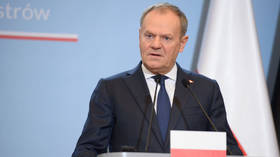[
Chancellor Olaf Scholz’s European policy has been “a total failure,” Friedrich Merz has said
EU leaders are avoiding German Chancellor Olaf Scholz, who either sits silent or tries to lecture them, his main political rival Friedrich Merz has claimed.
Merz, who heads the country’s largest opposition party, the conservative Christian Democratic Union (CDU), and will be its candidate for chancellor in the next election, launched another attack on Scholz in his newsletter MerzMail on Sunday.
The current German government’s EU policy has been a “total failure,” resulting in the chancellor being politically isolated in the bloc, he wrote.
“Regrettably, it should be said so: the majority of European politicians simply do not want to meet anymore the German Chancellor, who either sits silent for hours or lectures the world,” the CDU’s head stressed.
The latest example of Scholz’s isolation was the visit of French President Emmanuel Macron to Poland this week, during which the two NATO allies discussed policy with regards to Ukraine, he said. “The German Chancellor was not present again,” Merz noted.
According to the opposition leader, Scholz had been invited to the reopening of Notre-Dame Cathedral earlier this month, which had been attended by Macron, US President-elect Donald Trump and Ukrainian leader Vladimir Zelensky, “but he apparently had no desire to travel to Paris.”
“The demonstrative lack of interest” in EU policy by Scholz’s government is harmful for Germany as it is becoming a more and more serious obstacle to Berlin’s relations with its neighbors, he warned.
Germany is potentially heading into a snap election early next year after the collapse of the ruling ‘traffic light’ coalition between Scholz’s Social Democratic Party (SPD), the Free Democratic Party (FDP) and the Greens. According to multiple media outlets, the election could take place as early as February 23 if Scholz’s now-minority cabinet loses a confidence vote on Monday.
Merz has been a proponent of an increasingly tougher stance on Moscow, saying, among other things, that if he is elected, he will allow Ukraine to use German-supplied weapons for strikes deep into Russia.
Despite Berlin being the second-largest supplier of arms to Kiev after Washington under Scholz, the chancellor has repeatedly ruled out the delivery of his country’s long-range Taurus missiles. “Be careful! You do not play Russian roulette with Germany’s security,” he said last month.
After Kiev used US-made ATACMS missiles to strike Russia’s internationally recognized territory for the first time in November, Russian President Vladimir Putin warned that Moscow reserves the right “to use our weapons against the military facilities of those countries that allow the use of their weapons against our facilities.”



